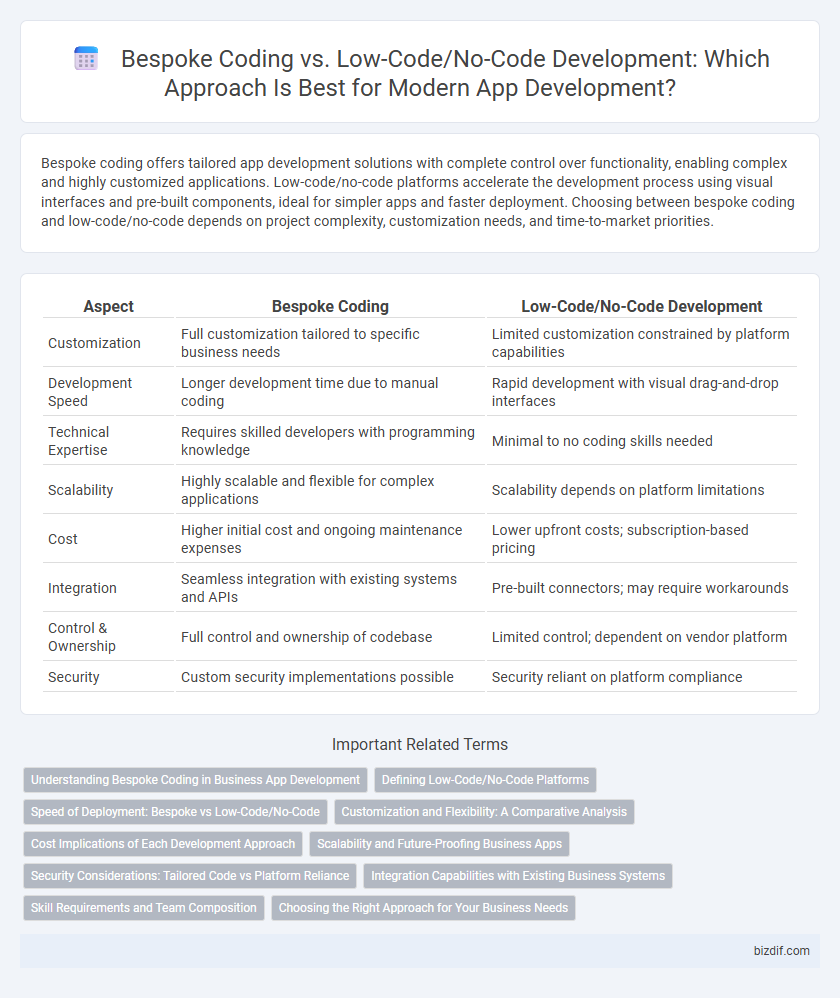Bespoke coding offers tailored app development solutions with complete control over functionality, enabling complex and highly customized applications. Low-code/no-code platforms accelerate the development process using visual interfaces and pre-built components, ideal for simpler apps and faster deployment. Choosing between bespoke coding and low-code/no-code depends on project complexity, customization needs, and time-to-market priorities.
Table of Comparison
| Aspect | Bespoke Coding | Low-Code/No-Code Development |
|---|---|---|
| Customization | Full customization tailored to specific business needs | Limited customization constrained by platform capabilities |
| Development Speed | Longer development time due to manual coding | Rapid development with visual drag-and-drop interfaces |
| Technical Expertise | Requires skilled developers with programming knowledge | Minimal to no coding skills needed |
| Scalability | Highly scalable and flexible for complex applications | Scalability depends on platform limitations |
| Cost | Higher initial cost and ongoing maintenance expenses | Lower upfront costs; subscription-based pricing |
| Integration | Seamless integration with existing systems and APIs | Pre-built connectors; may require workarounds |
| Control & Ownership | Full control and ownership of codebase | Limited control; dependent on vendor platform |
| Security | Custom security implementations possible | Security reliant on platform compliance |
Understanding Bespoke Coding in Business App Development
Bespoke coding in business app development involves creating custom software solutions tailored specifically to a company's unique processes and requirements, ensuring optimal performance and scalability. Unlike low-code/no-code platforms that rely on pre-built templates and limited customization, bespoke development enables full control over functionality, security, and integration with existing systems. This approach is ideal for businesses needing highly specialized features and long-term adaptability beyond the constraints of standard development frameworks.
Defining Low-Code/No-Code Platforms
Low-code/no-code platforms enable rapid application development through visual interfaces and pre-built components, minimizing the need for extensive hand-coding. These platforms empower non-developers to create functional apps by using drag-and-drop tools and configurable workflows, accelerating deployment and reducing reliance on traditional software engineering. Low-code/no-code solutions are ideal for prototyping and automating routine processes but may face limitations in customization and scalability compared to bespoke coding.
Speed of Deployment: Bespoke vs Low-Code/No-Code
Bespoke coding demands comprehensive development cycles, often extending deployment timelines due to custom coding and rigorous testing tailored to specific requirements. Low-code/no-code platforms accelerate speed of deployment by leveraging pre-built modules and drag-and-drop interfaces, enabling rapid prototyping and shorter time-to-market for applications. Enterprises prioritize low-code/no-code solutions when fast delivery is critical, though bespoke coding remains essential for highly complex or unique functionality that standard platforms cannot easily replicate.
Customization and Flexibility: A Comparative Analysis
Bespoke coding offers unparalleled customization and flexibility, enabling developers to tailor applications precisely to unique business requirements using traditional programming languages such as Java, Python, or C#. In contrast, low-code/no-code platforms accelerate development through pre-built templates and drag-and-drop interfaces but limit advanced customization and complex functionality integration. Enterprises seeking comprehensive control over user experience and system architecture typically prefer bespoke development despite higher costs and longer timelines.
Cost Implications of Each Development Approach
Bespoke coding typically incurs higher initial costs due to custom development efforts and skilled labor requirements, but it offers long-term savings through tailored functionality and scalability. Low-code/no-code platforms reduce upfront expenses by enabling faster deployment and minimizing the need for specialized developers, though they may lead to increased costs over time due to platform subscription fees, limited customization, and potential scalability issues. Evaluating cost implications involves balancing immediate budget constraints with future maintenance, flexibility, and the total cost of ownership in app development projects.
Scalability and Future-Proofing Business Apps
Bespoke coding offers unparalleled scalability by enabling custom-built solutions tailored specifically to evolving business needs, ensuring robust performance as user demands grow. Low-code/no-code platforms provide faster deployment but often face limitations in handling complex workflows or integrating advanced features crucial for long-term scalability. Future-proofing business apps requires evaluating the potential for seamless updates and adaptability, which bespoke development inherently supports through full source code control and extensive customization options.
Security Considerations: Tailored Code vs Platform Reliance
Bespoke coding offers enhanced security through custom-built solutions tailored to specific application requirements, reducing vulnerabilities often found in generic components. Low-code/no-code platforms rely on pre-built modules and third-party services, increasing the risk of inherent security flaws and limited control over critical security updates. Enterprises prioritizing robust data protection and compliance prefer bespoke development for its granular security management and adaptability to evolving threats.
Integration Capabilities with Existing Business Systems
Bespoke coding offers unparalleled integration capabilities with existing business systems by allowing developers to tailor APIs and middleware for seamless data exchange and workflow automation. Low-code/no-code platforms provide quicker integration options through pre-built connectors and visual interfaces, but they may face limitations with complex or highly customized legacy systems. Enterprises requiring deep customization and robust interoperability often prefer bespoke solutions to ensure comprehensive alignment with their unique business infrastructures.
Skill Requirements and Team Composition
Bespoke coding demands highly skilled software developers proficient in multiple programming languages and frameworks, ensuring custom solutions tailored to complex business needs. Low-code/no-code development platforms reduce the need for extensive coding expertise, enabling business analysts or citizen developers to participate actively in app creation. Teams relying on bespoke coding require specialized developers and often project managers, whereas low-code/no-code teams emphasize cross-functional collaboration with minimal coding experts.
Choosing the Right Approach for Your Business Needs
Bespoke coding offers tailored solutions that provide maximum flexibility and scalability, ideal for complex business requirements and unique workflows. Low-code/no-code platforms accelerate development with pre-built modules, reducing time-to-market and lowering costs, especially suited for businesses prioritizing rapid deployment and limited technical resources. Selecting the right approach depends on factors like project complexity, budget constraints, required customization, and long-term maintenance needs.
Bespoke Coding vs Low-Code/No-Code Development Infographic

 bizdif.com
bizdif.com